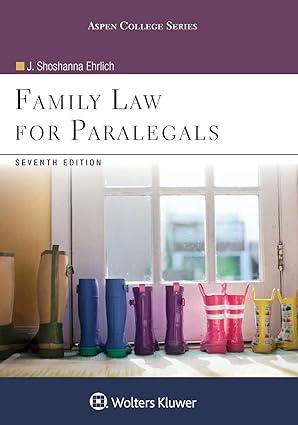Less than two years ago, this Court decided Webbv. Sowell, 387 S.C. 328, 692 S.E.2d 543 (2010),
Question:
Less than two years ago, this Court decided Webbv. Sowell, 387 S.C. 328, 692 S.E.2d 543 (2010), which held that ordering a non-custodial parent to pay college expenses violates equal protection, thus overruling thirty years of precedent flowing from Risinger \(v\). Risinger, 273 S.C. 36, 253 S.E. \(2 d 652\) (1979). We granted permission in this case to argue against precedent . . so that we could revisit our holding in Webb. Today, we hold that Webb was wrongly decided and remand this matter for reconsideration in light of the law as it existed prior to Webb. In \(W e b b\), we were asked to determine whether requiring a noncustodial parent to pay college expenses was a violation of equal protection.... Absent an allegation that the classification resulting in different treatment is suspect, a classification will survive an equal protection challenge so long as it rests on some rational basis. If we can discern any rational basis to support the classification, regardless of whether that basis was the original motivation for it, the classification will withstand constitutional scrutiny. In Webb, the majority viewed the classification created by Risinger for equal protection purposes as those parents subject to a child support order at the time the child is emancipated.... Without any elaboration, the majority concluded that there is no rational basis for treating parents subject to such an order different than those not subject to one with respect to the payment of college expenses. Upon further reflection, we now believe that we abandoned our long-held rational basis rule that the party challenging a classification must prove there is no conceivable basis upon which it can rest and inverted the burden of proof. This State has a strong interest in the outcome of disputes where the welfare of our young citizens is at stake. As can hardly be contested, the State also has a strong interest in ensuring that our youth are educated such that they can become more productive members of our society. It is entirely possible "that most parents who remain married to each other support their children through college years. On the other hand, even well-intentioned parents, when deprived of the custody of their children, sometimes react by refusing to support them as they would if the family unit had been preserved." In re Marriage of Vrban, 293 N.W.2d 198, 202 (Iowa 1980). Therefore, it may very well be that Risinger sought to alleviate this harm by "minimiz[ing] any economic and educational disadvantages to children of divorced parents." Kujawinski v. Kujawinski, 71 Ill. 2d 563, 376 N.E.2d 1382, 1390, 17 Ill. Dec. 801 (Ill. 1978)... There is no absolute right to a college education, and section 63-3-530(A)(17), as interpreted by Risinger and its progeny, does not impose a moral obligation on all divorced parents with children. Instead, the factors identified by Risinger and expounded upon in later cases seek to identify those children whose parents would otherwise have paid for their college education, but for the divorce, and provide them with that benefit....
Questions:
1. Why did the Webb court conclude that it was unconstitutional to require noncustodial parents to contribute to their children's college expenses?
2. What interests of the state did the court take into account in reaching its decision?
3. What did the court have to say about noncustodial parents when it comes to helping their children with college expenses? What did the court say about this father in particular?4. What exactly did the court rule with regard to the circumstances under which it may be appropriate to order a parent to help with his or her child's college expenses?
Step by Step Answer:






